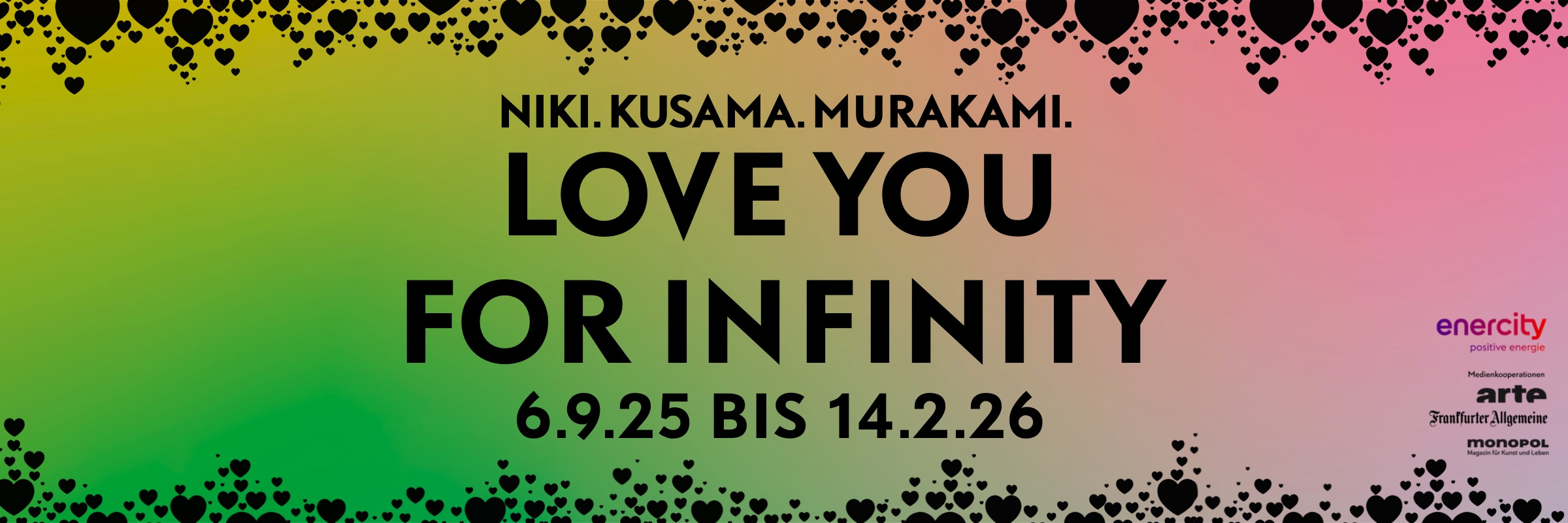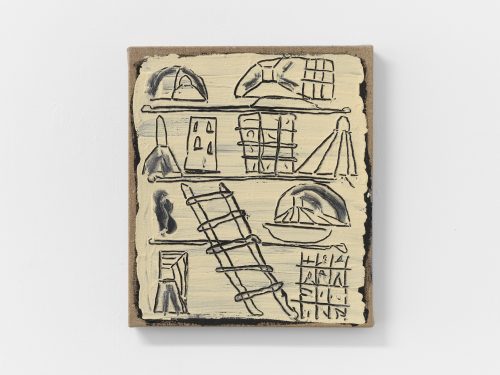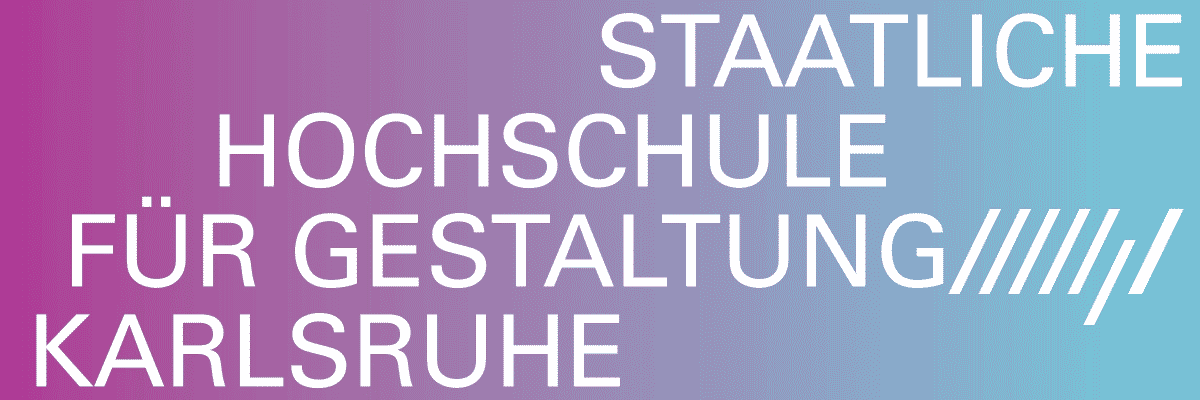
Kay Yoon
Of Hungry Ghosts, Housewives and Untold Stories
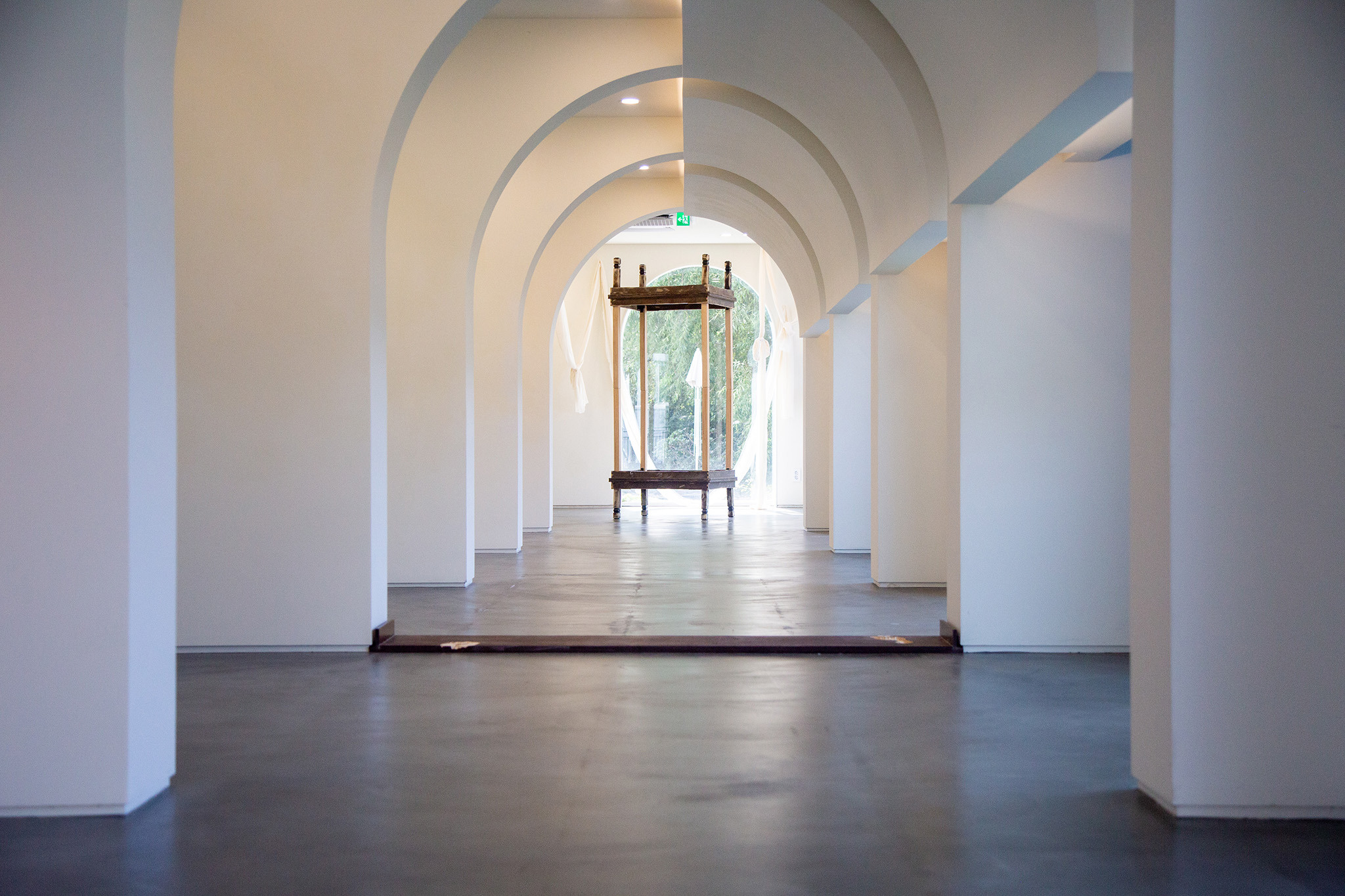
Exhibition View <Of Hungry Ghosts, Housewives and untold Stories>
Advertisement
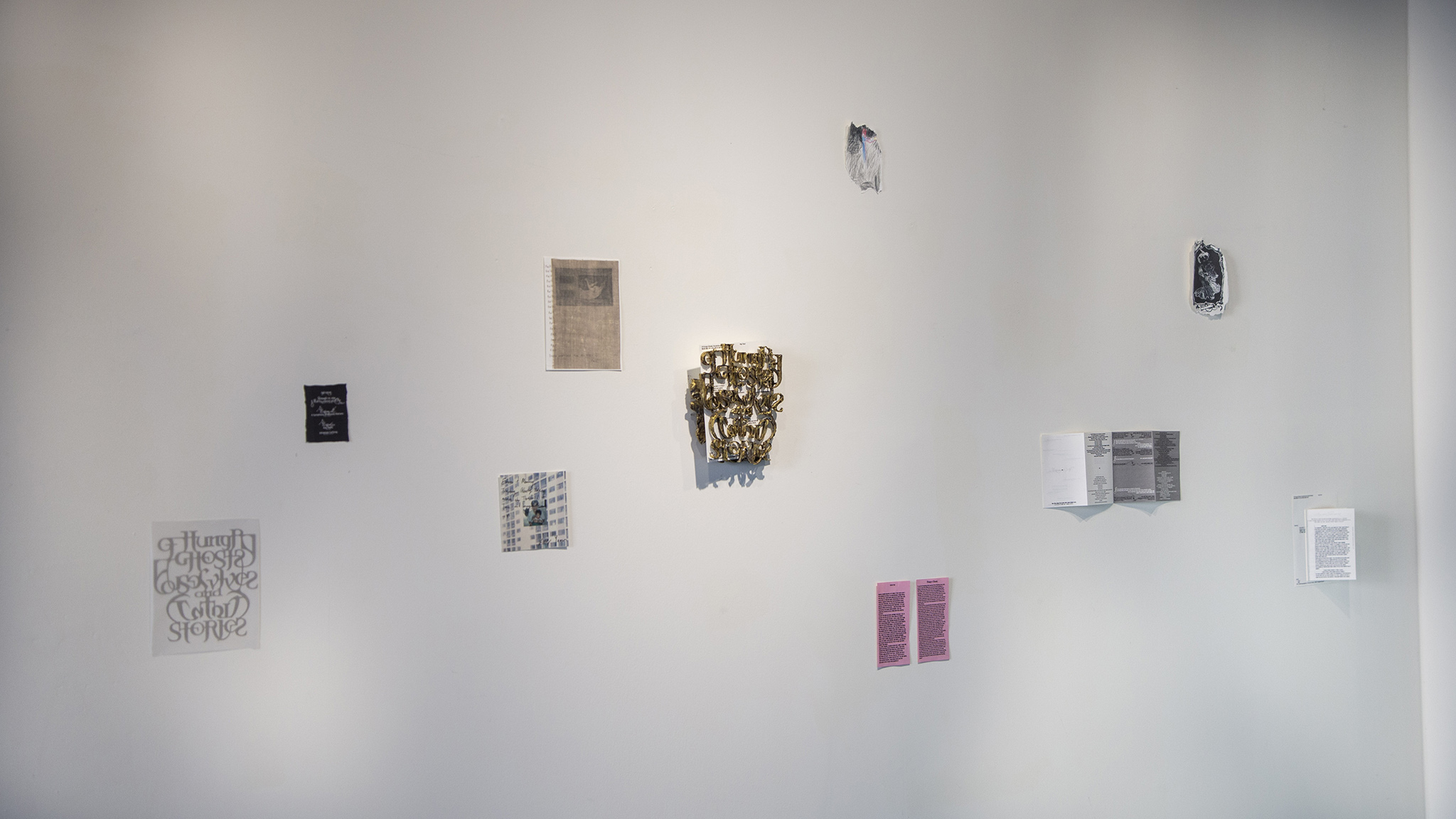
A booklet made in a collaboration with Muon studio, graphic designer: Minju Park
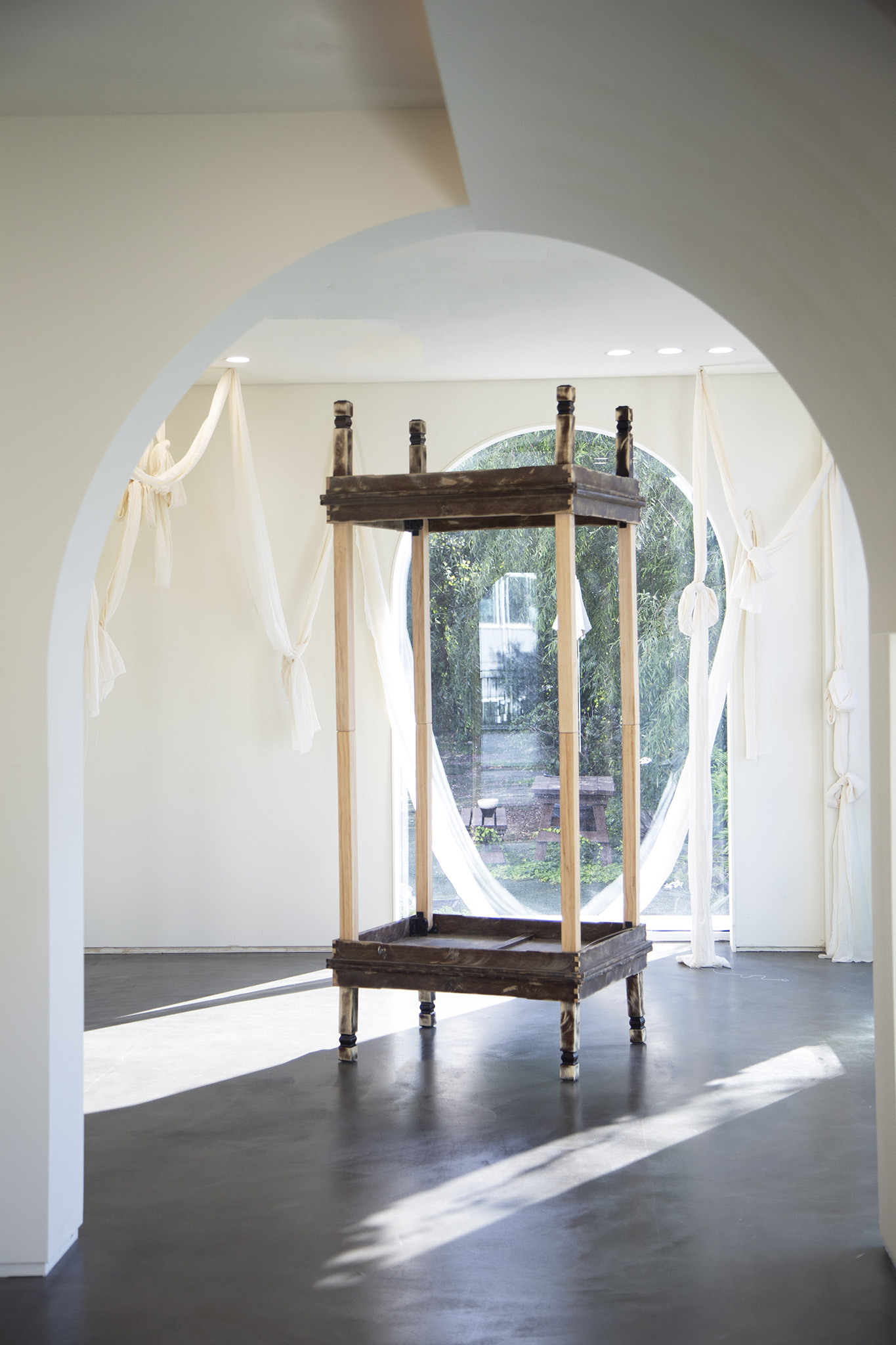
Second Stop - Polyphonic Representation (Zweite Haltestelle: représentations polyphoniques), 2024, gyoja table, ritual spoon, key lock and key, 90 x 75 x 210 cm

Detail view of <Second Stop - Polyphonic Representation (Zweite Haltestelle: représentations polyphoniques)>

Detail view of <Second Stop - Polyphonic Representation (Zweite Haltestelle: représentations polyphoniques)>
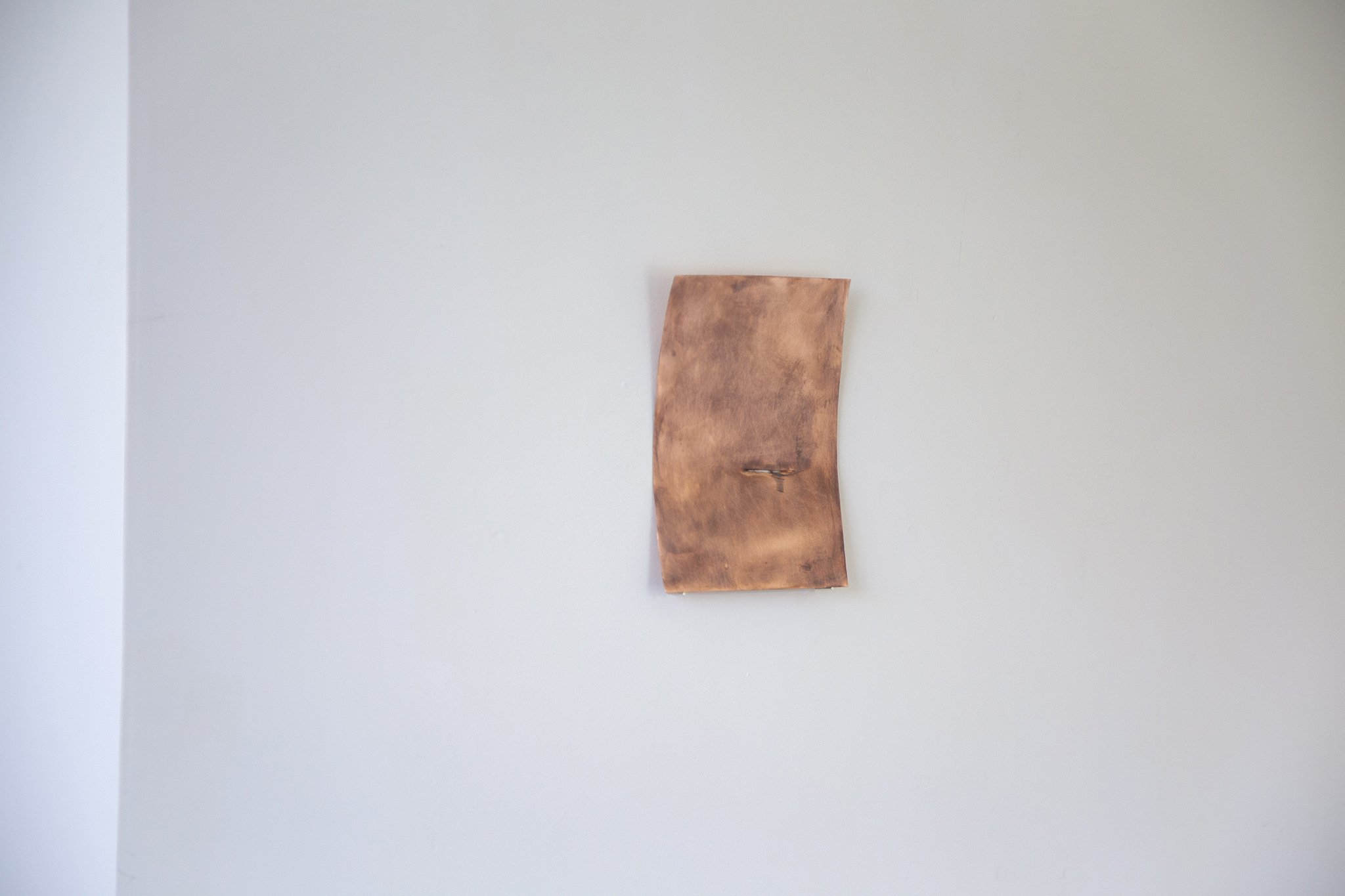
Scar, 2024, Cooper, 18.5 x 23 cm
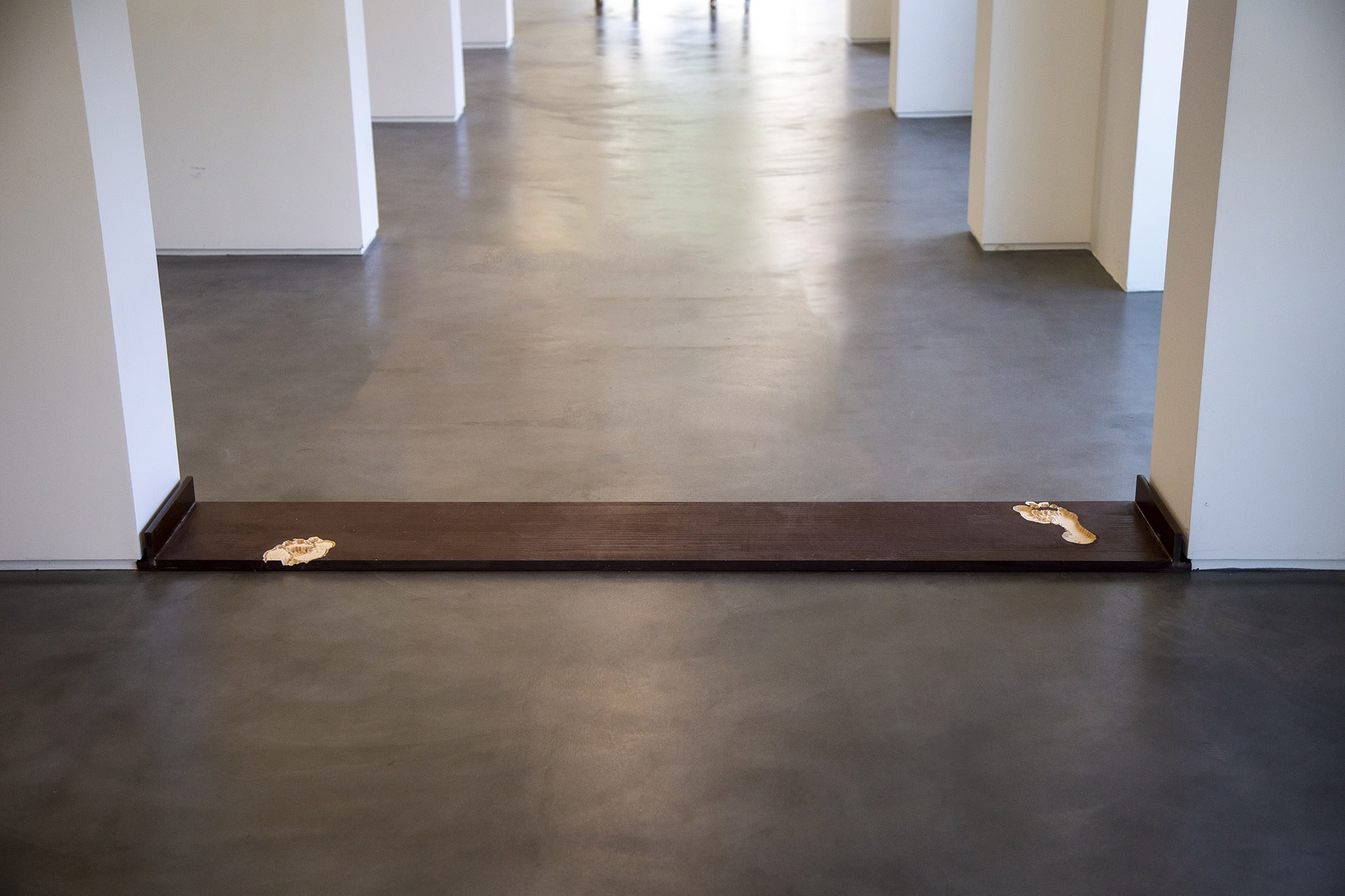
Threshold (문간방), 2024, Gyoja Tables, 187 x 30 cm
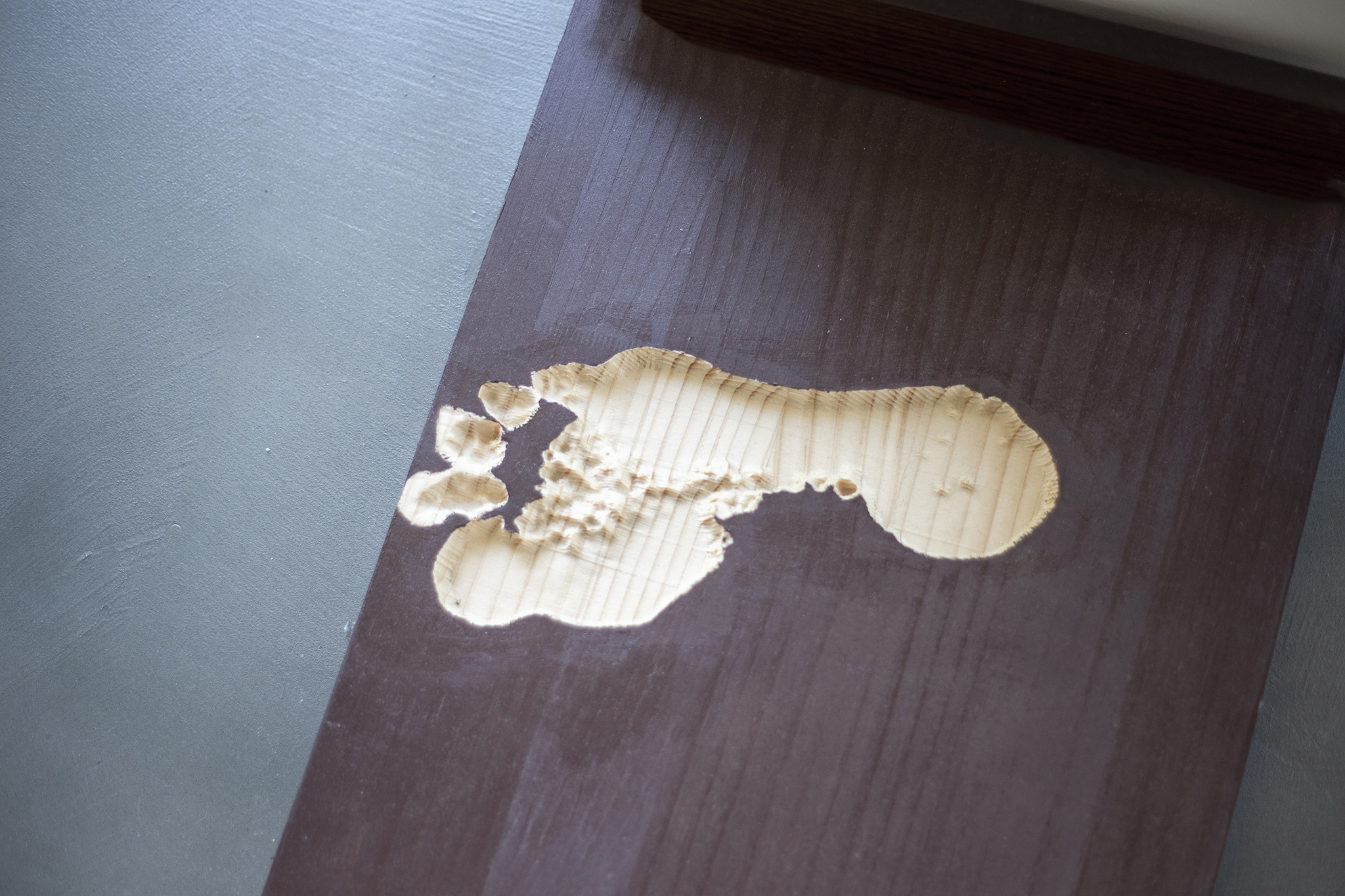
Detail view of <Threshold (문간방)>
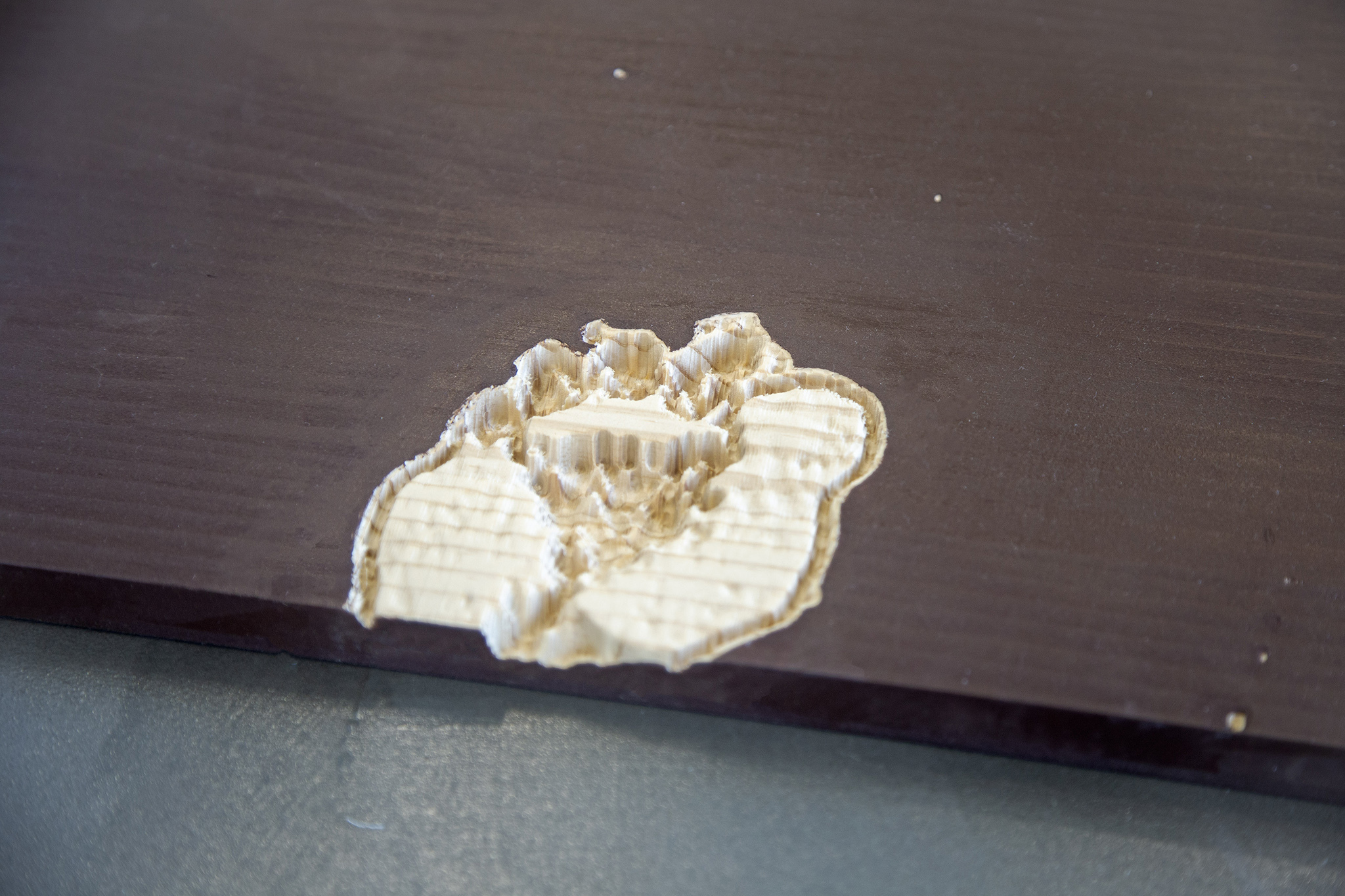
Detail view of <Threshold (문간방)>
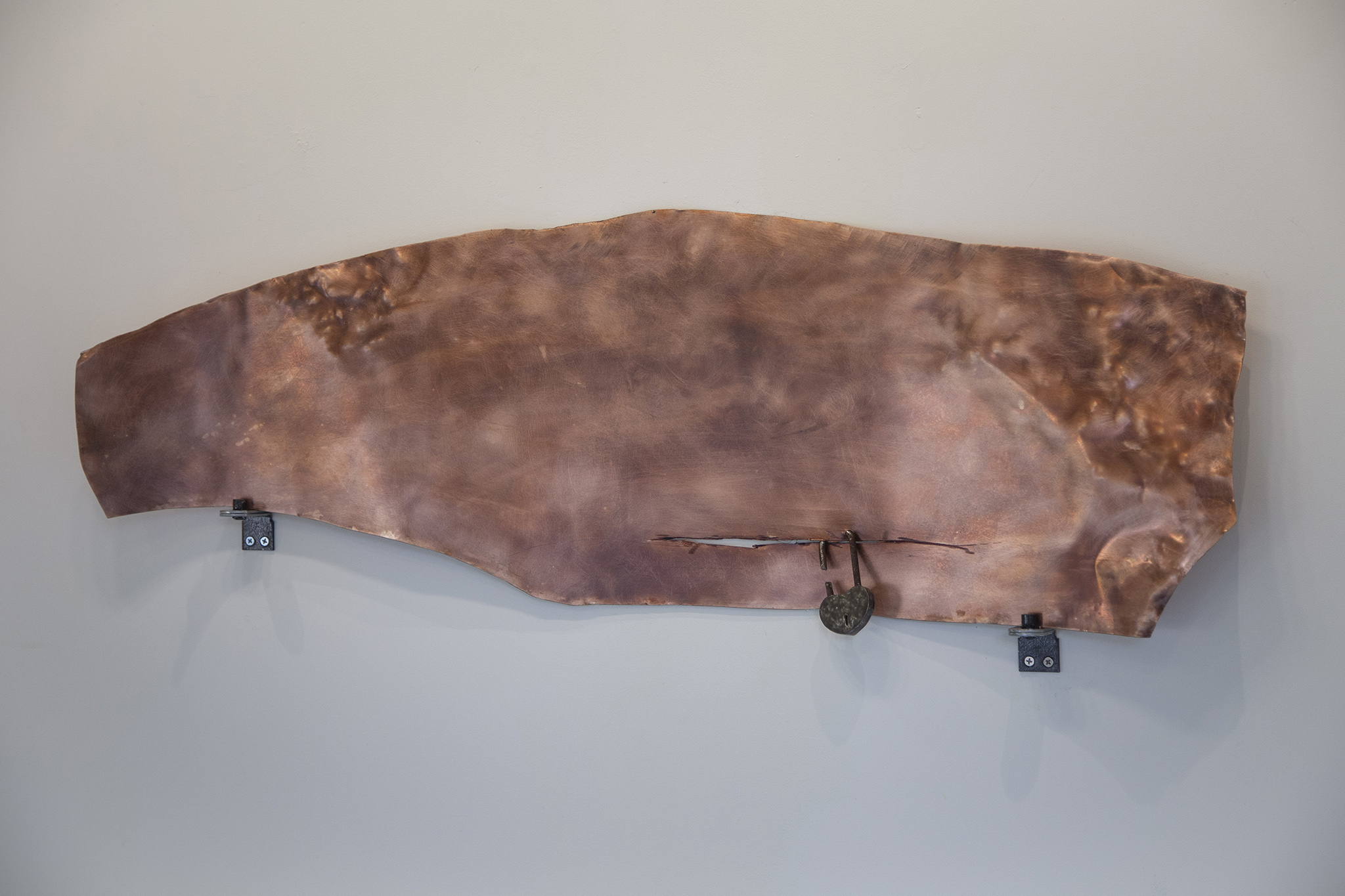
A Wall Whispers The Promise Of Reunion, 2024, Cooper Plate, A Lock from the Bridge of Love in Kosice, 97 x 35 cm
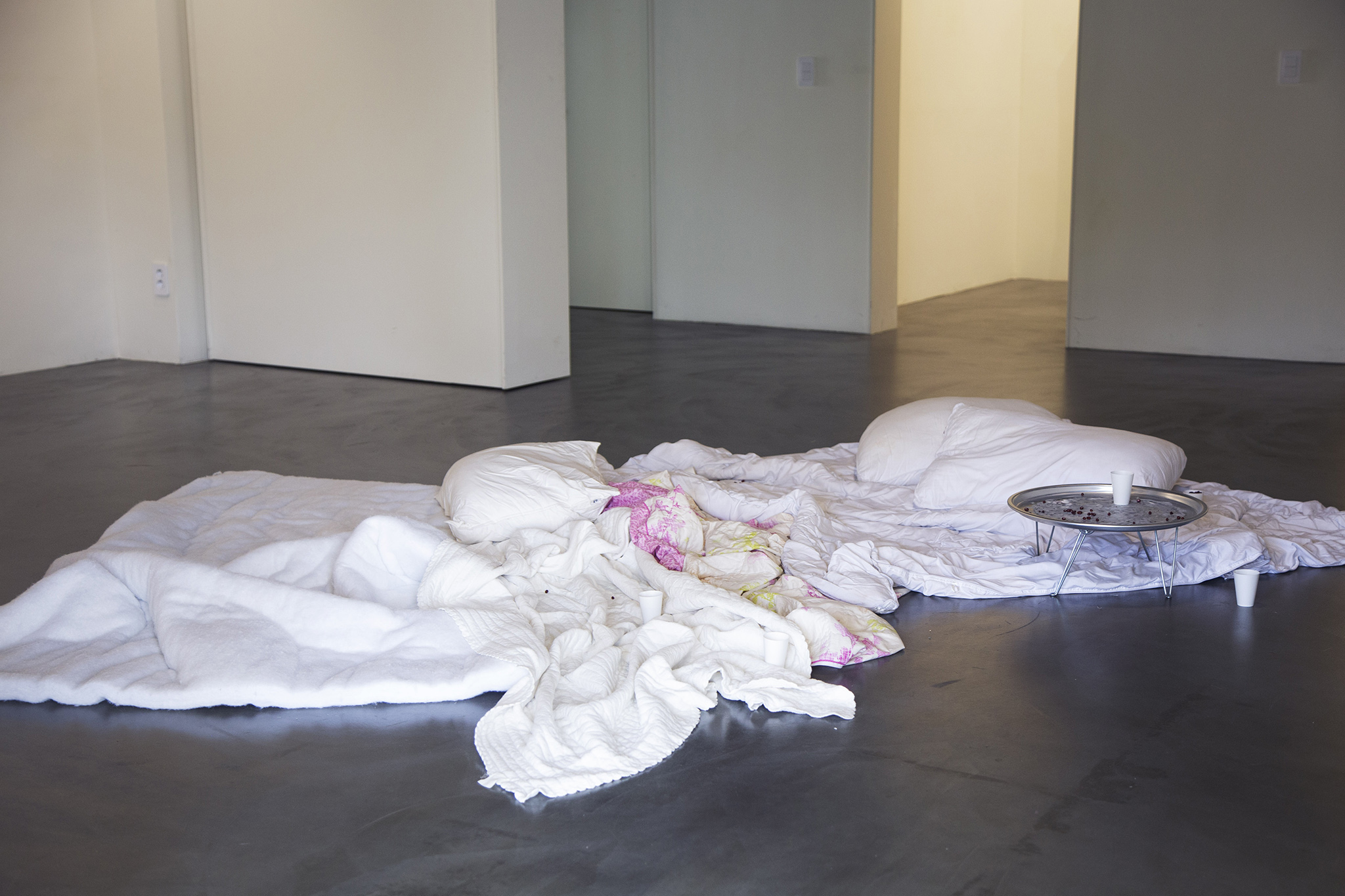
Nightmare: A Mouth Is A House (part 2) , 2024, blankets and pillows of recently deceased people, tin coated table, red beans and paper Cups
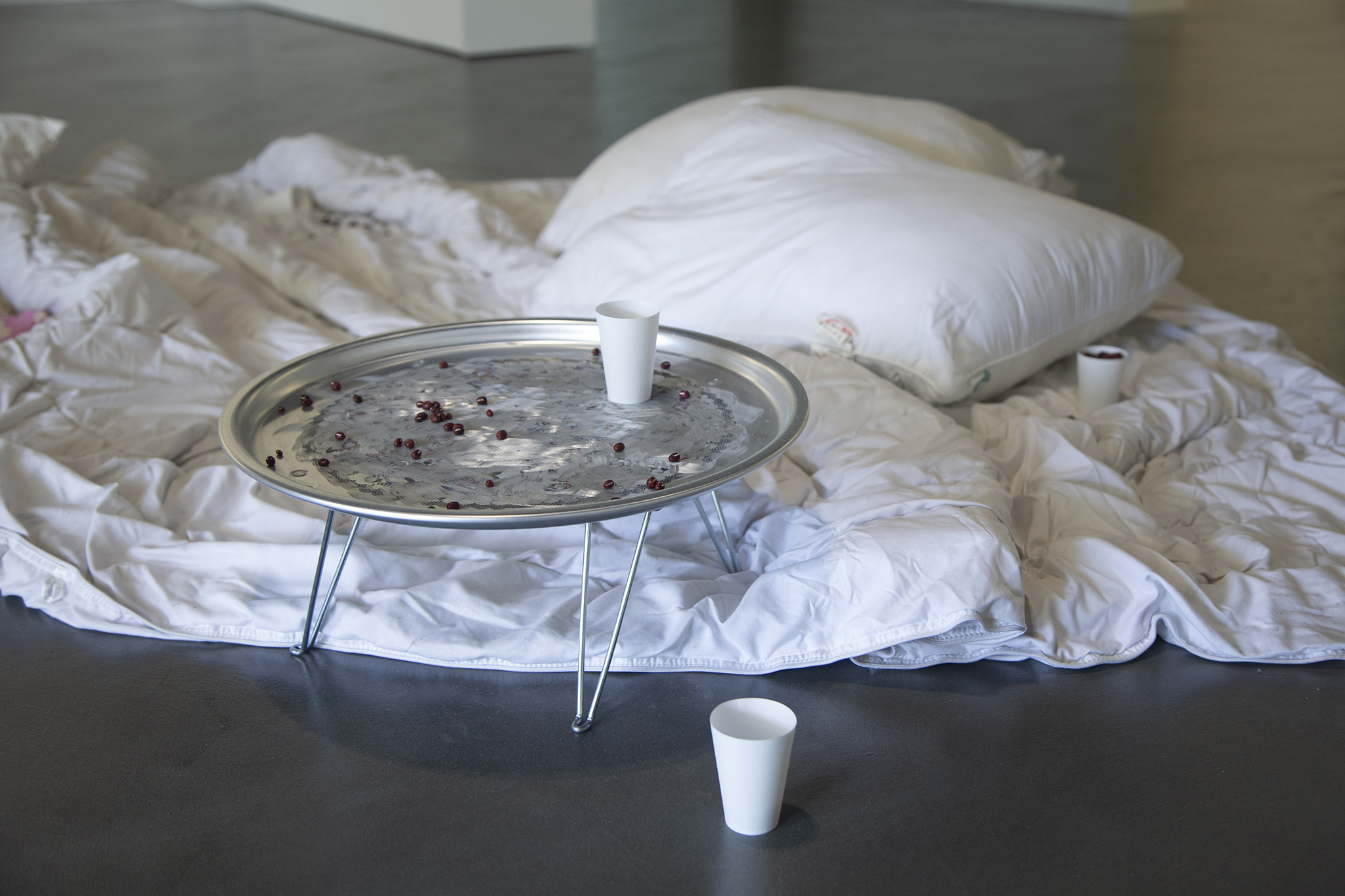
Detail view of <Nightmare: A Mouth Is A House (part2) >
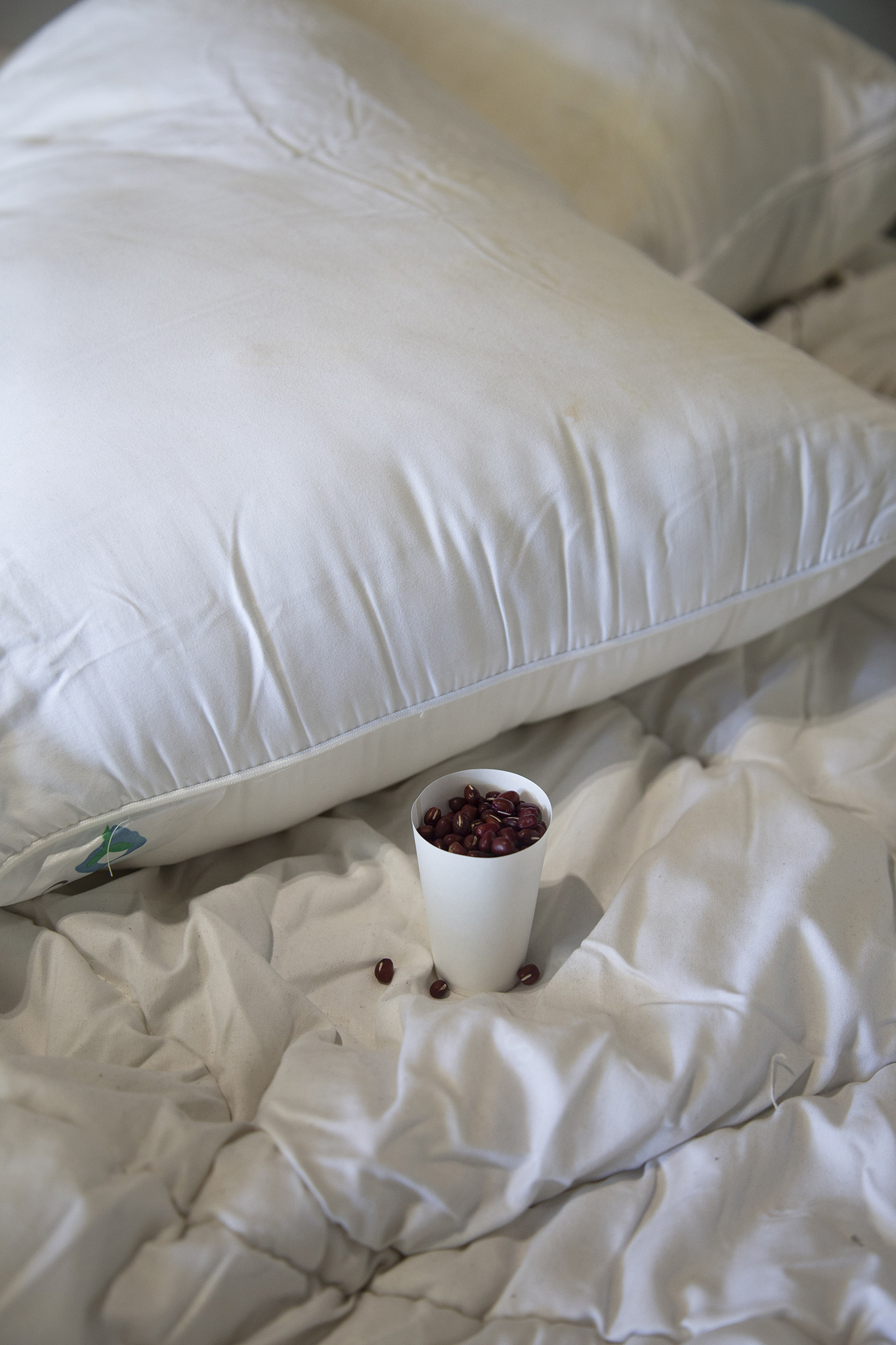
Detail view of <Nightmare: A Mouth Is A House (part2) >
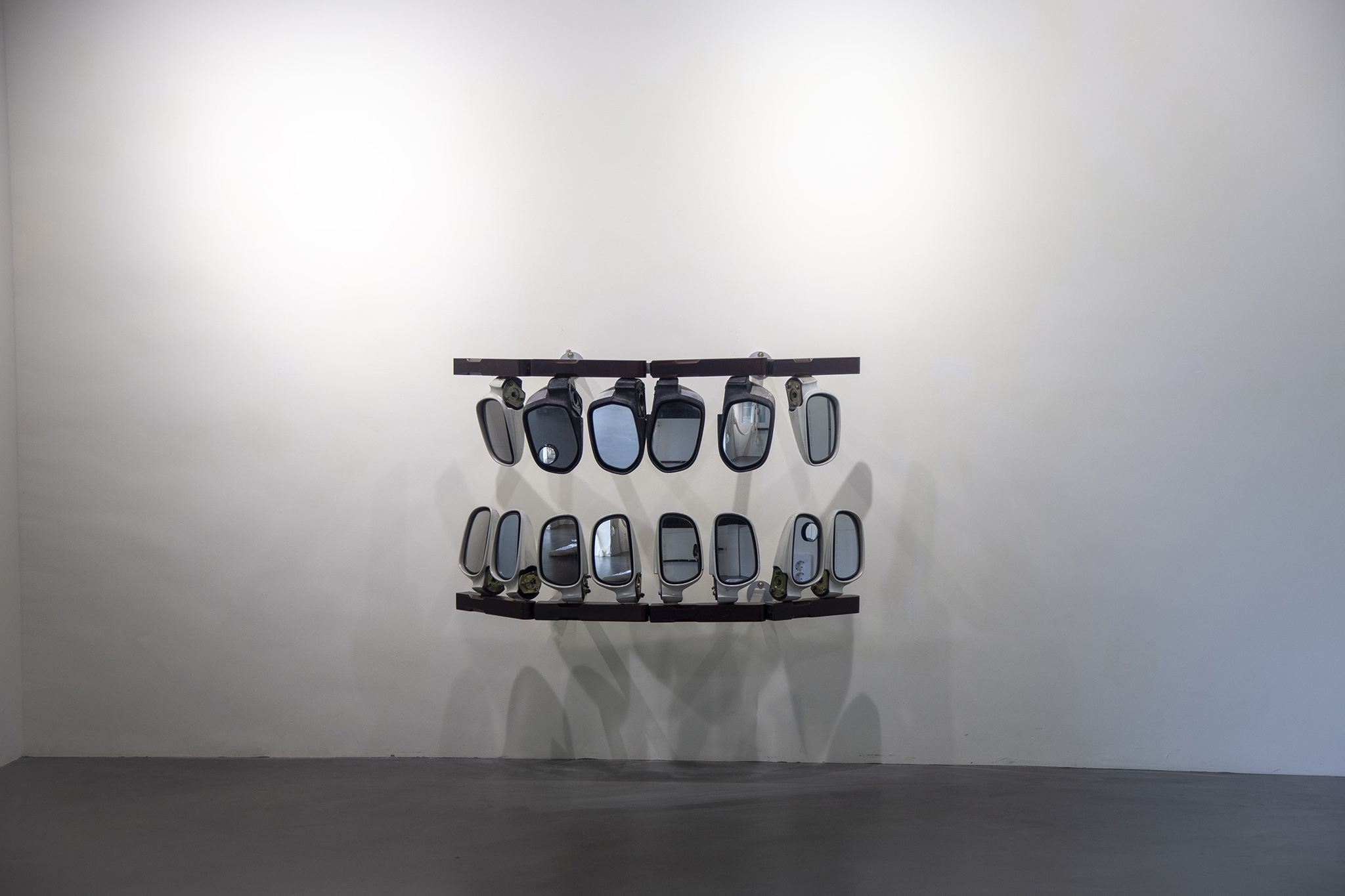
Nightmare: A Mouth Is A House (part 1), side mirrors, gyoja table legs, stainless steel
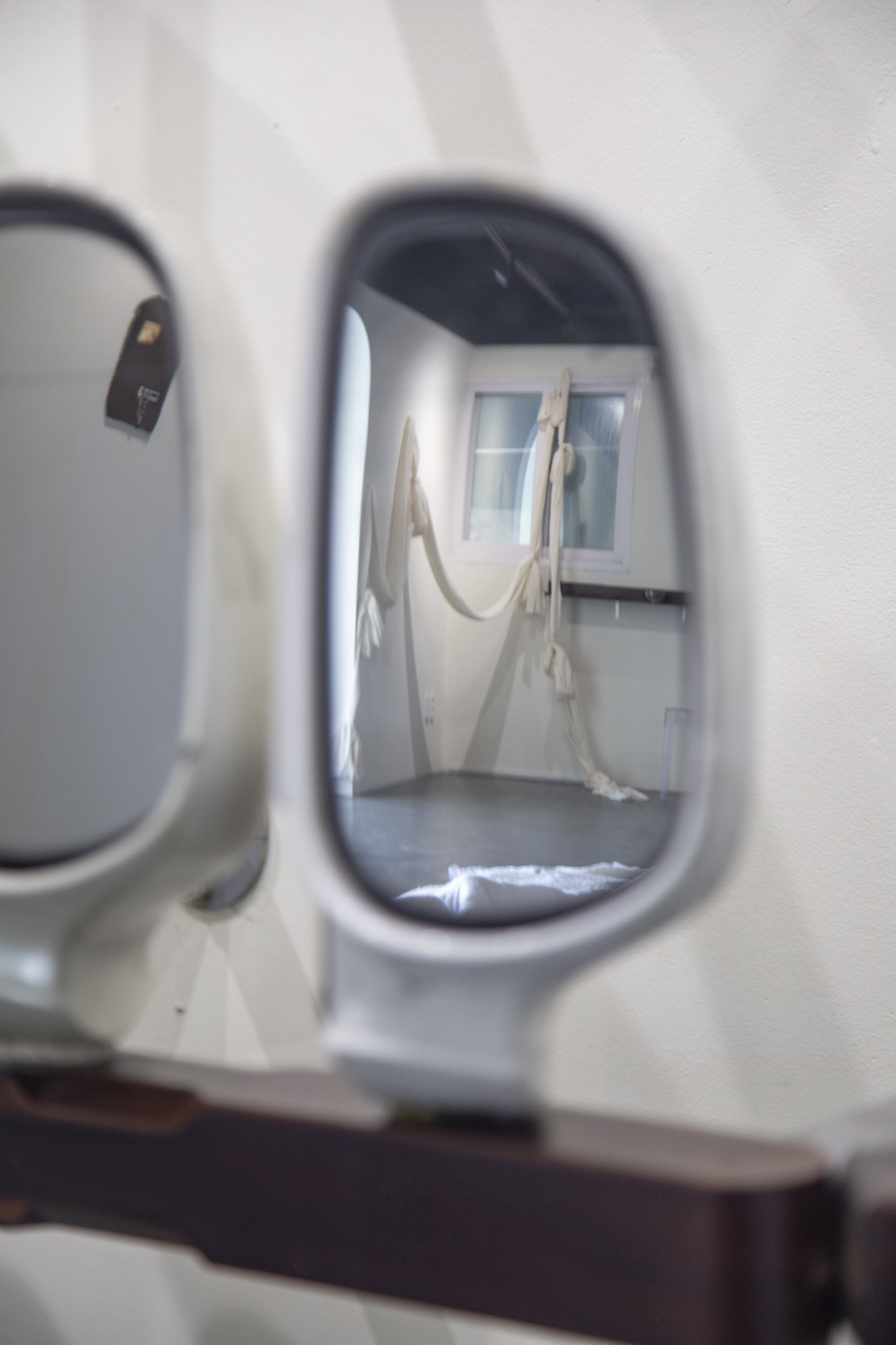
Detail view of <Nightmare: A Mouth Is A House (part1)>
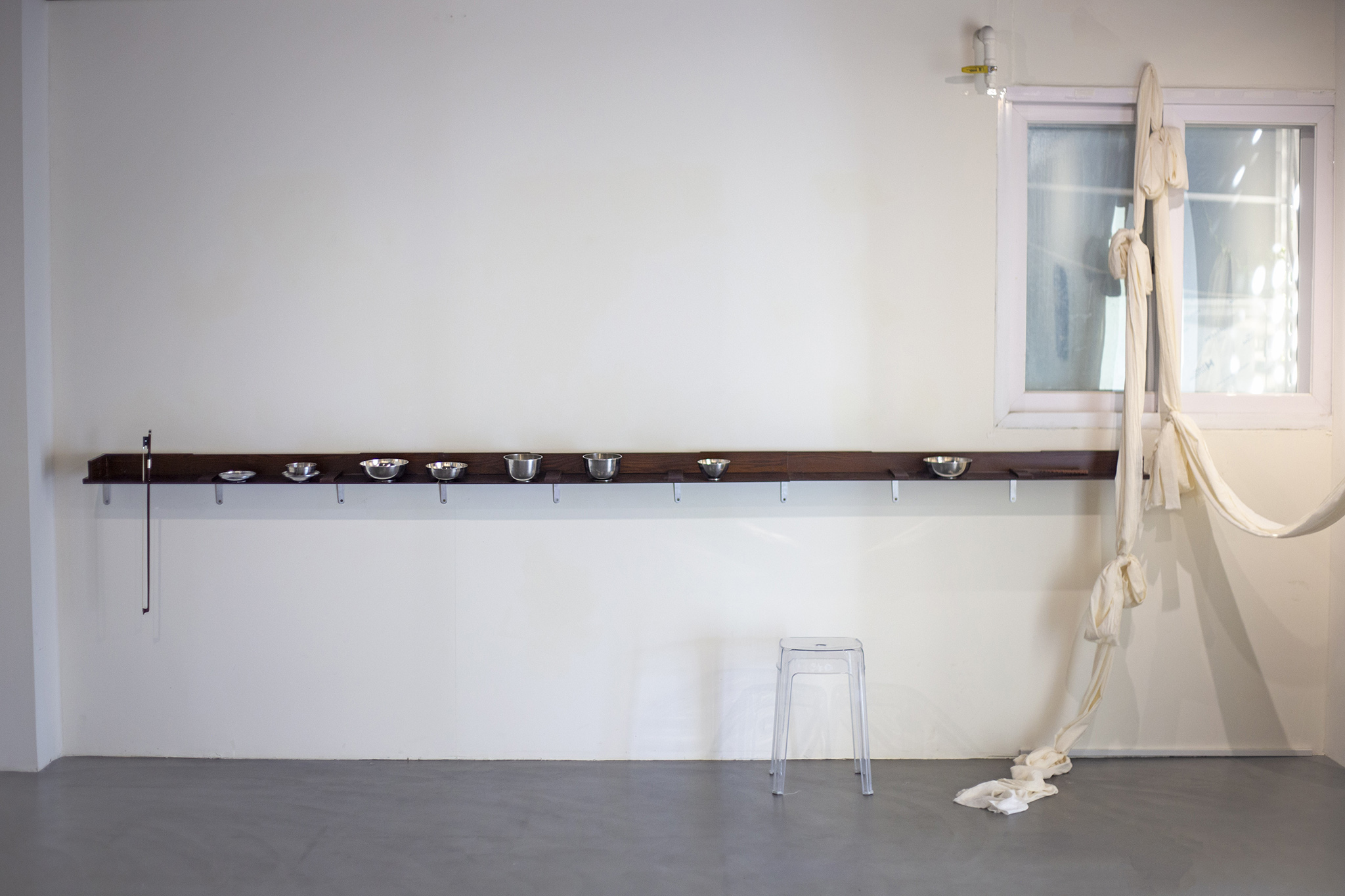
Objects are closers than they might seem (사물은 보이는 것 보다 가까이 있다), 2024, Gyoja tables, stainless steel bowls, red beans, violin bow, acrylic chair, 340 x 20 cm
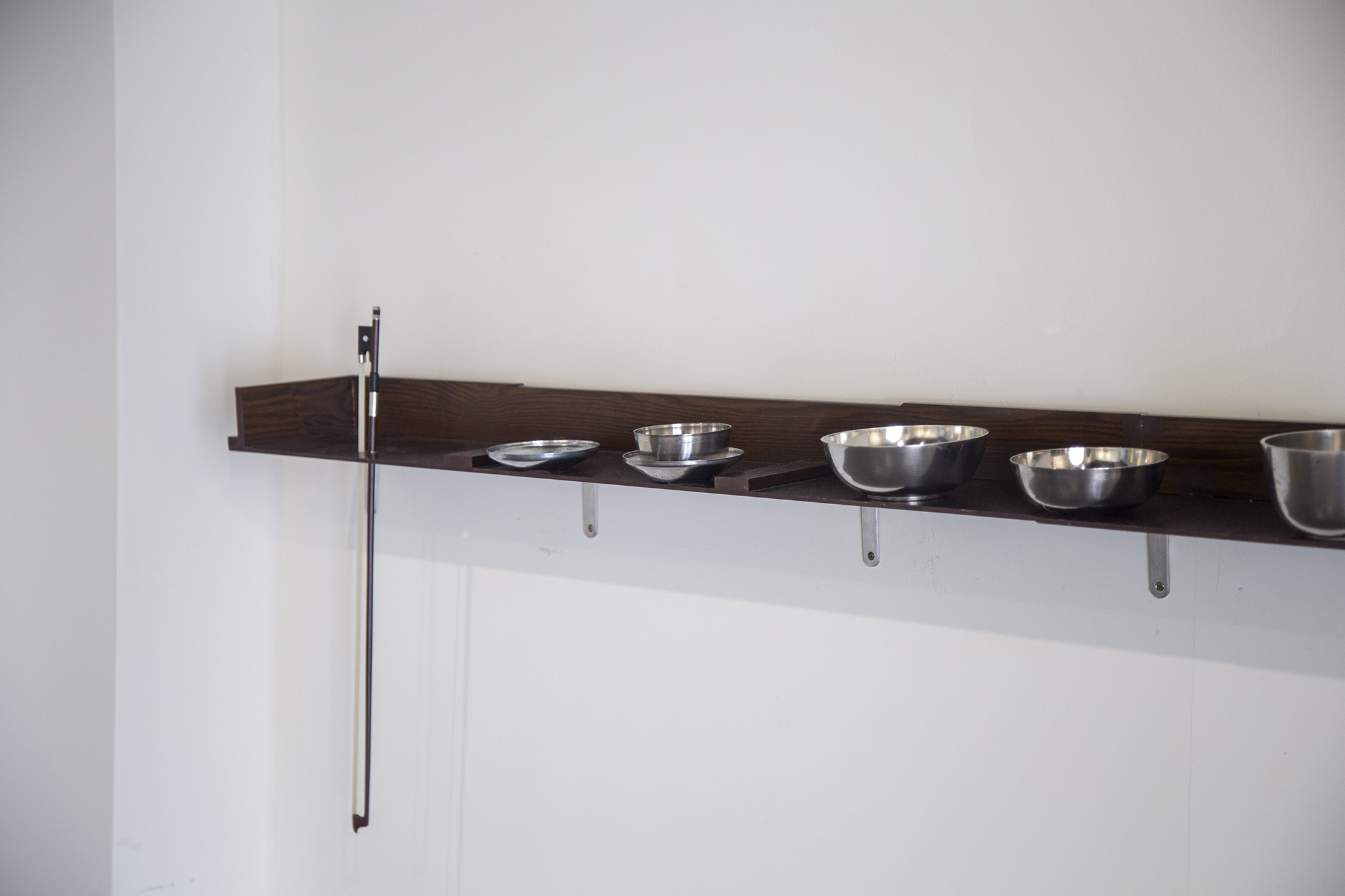
Details of <Objects are closers than they might seem (사물은 보이는 것 보다 가까이 있다)>
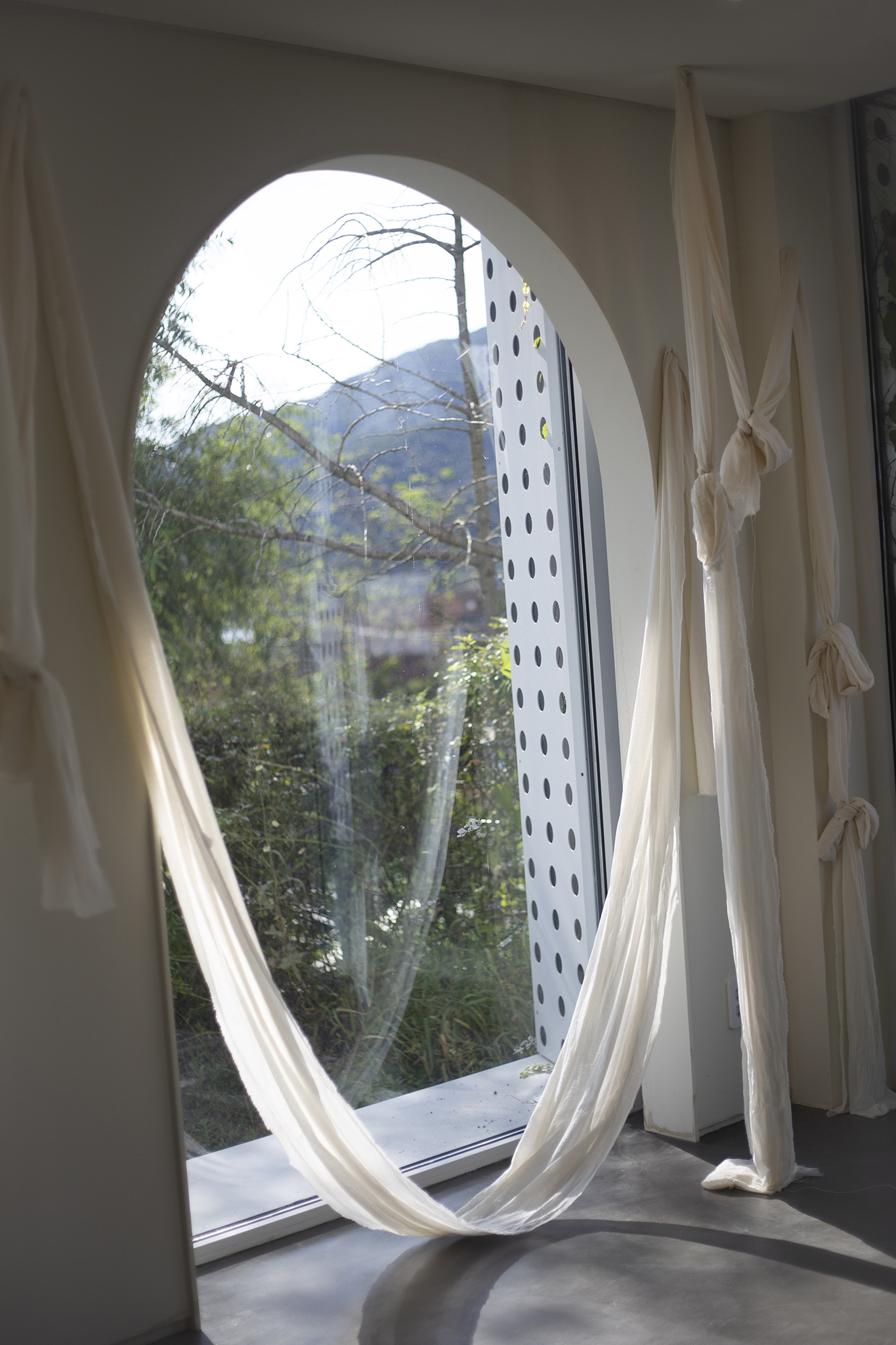
Gopulee: Ritual to release grief, 2024, Site-specific installation, Cotton, Variable Dimension
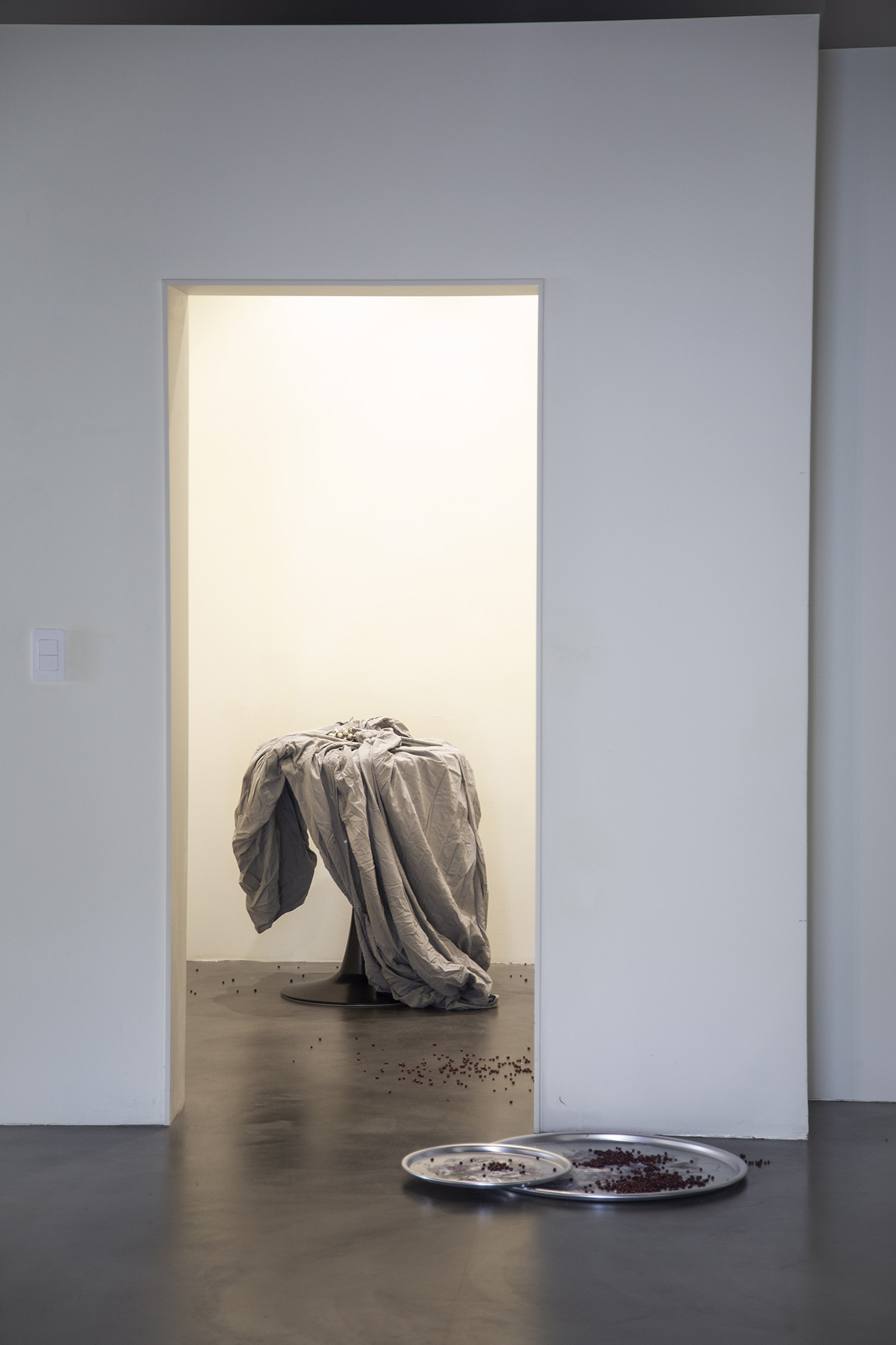
With the Steps of the Ghostly Matters, 2024, Site-specific installation, tin coated trays, red beans, blankets of recently deceased people, bells and steel
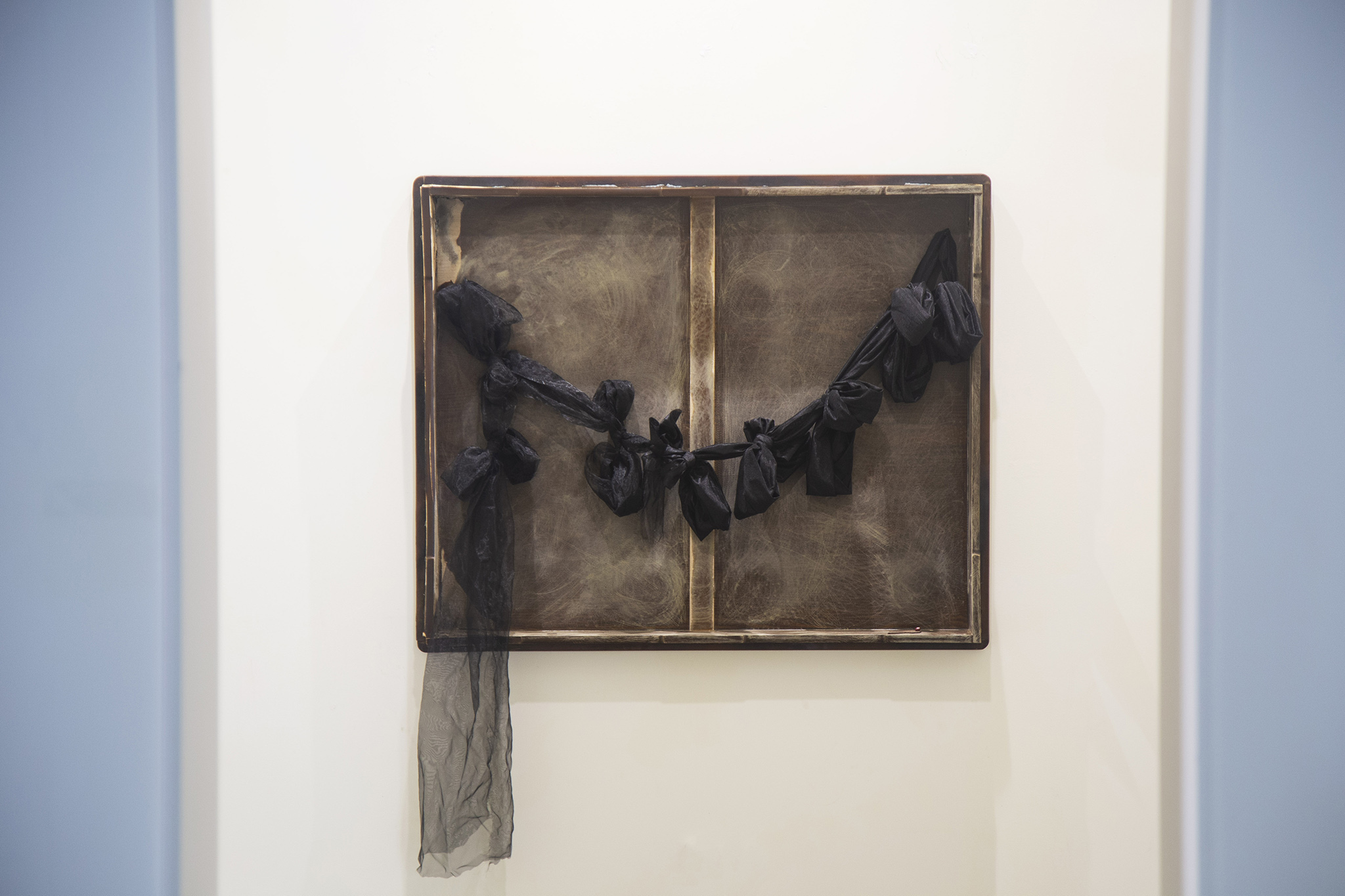
The Window where the Wind Carries the Han(恨), 2024, cotton, silk, gyoja table, 90 x 70 cm
Phantasma Chasing the Trajectory of a Phantasma
Joo-ok Han (independent Curator)
Kay Yoon is an enigmatic storyteller, whose narratives permeate the air like a gentle hum, transcending the boundaries of language. Her stories unfold through various mediums—reading, writing, and speaking—yet persist beyond these conventional forms. One might discern her presence through a rhythmic cadence or the faint whisper of an ethereal being. Intrigued by the genesis and evolution of these tales, I posed several questions to unravel her creative process.
Some artists weave stories from the tapestry of memories and imagination, while others navigate the liminal space between reality and fantasy. In response to my inquiry, the artist shared an illuminating passage from German sociologist Frigga Haug's seminal work, "Female Sexualization: A Collective Work of Memory": If "the margins of the story mark a border between the remembered and the forgotten: (Haug et al. 1987:68), my use of fiction to designate this border intends to call attention to both the broader issues of invisibility, marginality, and exclusion, and also to the "twist[s] and turn[s], reinterpret[ations] and falsify[cations], forget[tings] and repress[ings] [of] events" (ibid,:40)
Memory, in its persistence, resurrects fragments of the past, briefly illuminating them with startling clarity before they recede into the ebb and flow of forgetfulness. Like undulating waves, memory and oblivion touch, separate, and resurface in an endless cycle. Within this flux, Kay Yoon adopts a contemplative stance—not merely to resuscitate the past, but to scrutinize the dissonances of the present. Her work illuminates distorted relationships and excavates narratives gradually disappearing into obscurity. Through this process, repressed emotions and silenced voices emerge from the complex interplay between reality and ideology, self and other, leaving an indelible imprint on our collective consciousness.
This profound reflection materializes in the exhibition <Of Hungry Ghosts, Housewives and Untold Stories>, where these themes are rendered tangible through visual and tactile objects, interwoven with gestures and language that coalesce into sound and movement. Echoing the 'ghosts,' 'housewives,' and 'untold stories' of the title, Yoon manifests as an elusive presence—seemingly within reach, yet quick to vanish. Empowered by an ineffable force inherited from these spectral entities, she assumes the role of a messenger, bearing their narratives forward.
The artist's keen eye discerned a striking resemblance between the layout of the Metal House Gallery and Nokwoodang (綠雨堂), the traditional dwelling of her childhood. This architectural parallel informs the exhibition's composition, with six works arranged to mirror the gallery's square configuration. These pieces transform into dynamic spaces representing thresholds—the liminal boundaries that captivate the artist—inviting the audience into the narrative. In this way, her exploration of boundaries manifests through scenes where material and virtual realms intersect, each piece organically guiding the exhibition's flow.
"We need to understand where we are in order to imagine living elsewhere. Memory is a room, let's cross the door." (An excerpt of the artist's reading performance)
The act of crossing the threshold transcends physical boundaries, ushering one into a new dimension. The floor installation Threshold (문간방) (2024) bears the imprint of memories intermingled with intangible experiences. Yoon reinterprets the traditional concept of a threshold through sculpture and installation, transforming it into a space for audience engagement. Thus, the work functions as both portal and passageway, guiding viewers through an active space where dormant memories stir and faint sounds awaken the senses.
One encounters Second Stop – Polyphonic Representations (Zweite Haltestelle: représentations polyphoniques) (2024) along the corridor—an installation featuring two rectangular gyoja tables stacked vertically. For the artist, who spent years abroad, dining tables from both Europe and Korea become metaphorical objects encapsulating cultural intersections, temporal accumulation, and layered experiences. The weathered tables, smoothed by sandpaper, along with objects like spoons, chopsticks, and a key's locking mechanism, possess a deceptively mundane aesthetic yet assume monumental form, imbued with the artist's subconscious expression.
It's crucial to note that in her previous works, the artist has consistently explored the theme of transcending (non-)physical boundaries, whether by navigating mediums like air and vibration or approaching performance through non-verbal expressions. Through installations composed of diverse objects and ritualistic performances, these processes subvert spatial hierarchies, catalyzing conceptual links and presenting a field of exploration where the artist's gaze converges. Works such as Nightmare: A Mouth is A House (2024) and Objects are Closer Than They Might Seem (2024) evoke this contemplation, culminating in a multilayered sensory experience. Borrowing its title from the cautionary phrase on car side mirrors, Objects are Closer Than They Might Seem exposes the ambiguity between physical reality and perception, reaffirming that objects harbor meanings beyond their visible form. This line of inquiry culminates in installations where ritual elements, like offerings and ceremonial tools, are arranged in their most elemental forms. The performance “A Symphony of Ghostly Matters” weaves together metaphors of the tangible and intangible, traversing boundaries between reason and unreason, reunion and loss, reality and the virtual.
In the exhibition's denouement, the artist presents A Woman Who Opens The Door: Juliana Korponajova (2024), summoning a figure who met a tragic fate in early 18th-century Slovakia. Juliana Korponajova, executed for opening the door to rebels, became known as the "White Lady"—a spectral presence. In this context, the artist explores the intricate interplay of life and death, individual histories, and collective memories, binding her own interpretation to the wandering ghost. To grasp memory more vividly, the artist traces the role of the ghost and the vestiges of narrative. Even if it is merely an illusion without substance, she excavates the imagined realm that mediates between spirit and long-forgotten memories—the images and sounds remembered through imagination. This process intertwines the artist's reflections on her own existential concerns, living like a ghost, and a profound contemplation of existence itself.
The exhibition showcases six new works, accompanied by a performance, intricately connected to suffuse the space like a burgeoning presence, coalescing into a singular, cohesive work. In essence, the elements comprising the exhibition move with their individual narratives, coexisting simultaneously. And within that space, one may encounter the wandering ghost, the phantasma chasing the trajectory of a phantasma—the storyteller herself.
Joo Ok Han

